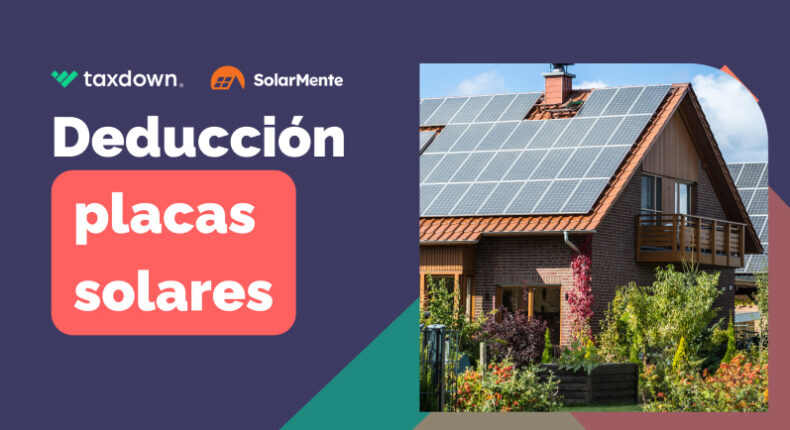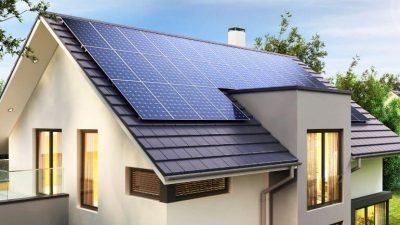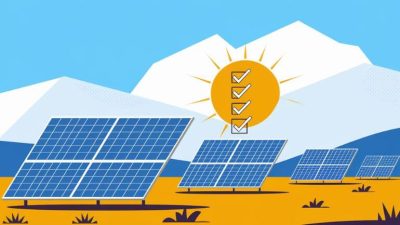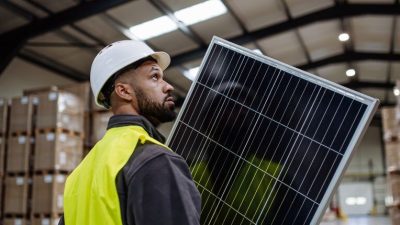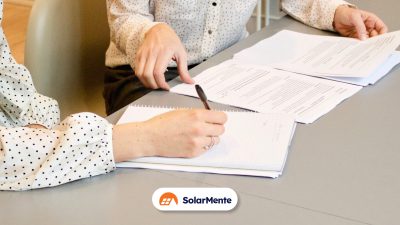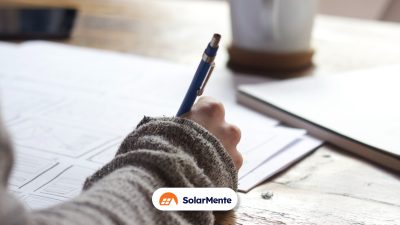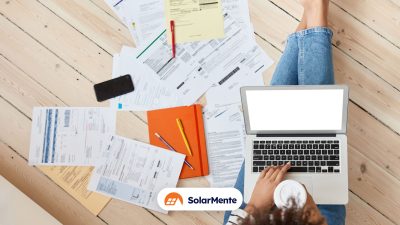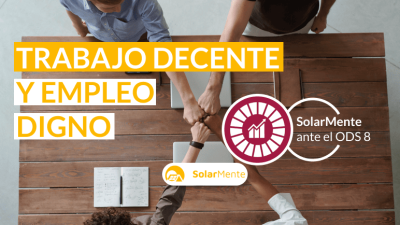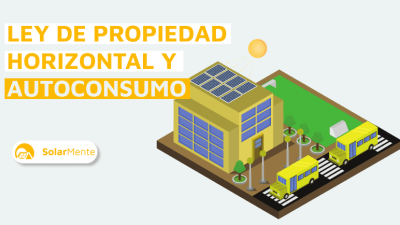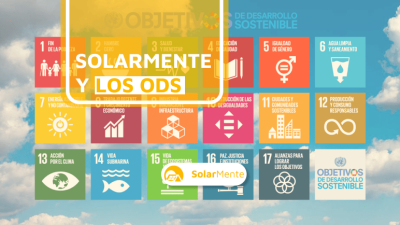Since the declaration of the climate emergency in 2020, the government has implemented various public policies to boost the integration of renewable sources into the energy matrix.
Among the most solid measures are the tax benefits for the installation of solar panels, a valuable tool to improve the economic situation at the household level.
What exactly are the tax benefits for solar panels?
Imagine being able to deduct one euro for every five euros invested in the installation of photovoltaic cells. The truth is that the Tax Agency, both at state and regional level, has various incentive programmes that translate into significant reductions in the IRPF (Personal Income Tax) that you may have to pay.
As this is a deduction that is reflected in the tax return, you may experience a reduction in the amount payable, or even receive a refund if the amount is returned.
Who can apply for it?
The IRPF deduction for the installation of solar panels is available to those who own or rent a home, as long as it is not used for commercial purposes.
Under certain circumstances, it is possible to extend these deductions to garages and warehouses you own in predominantly residential areas. This means that virtually any home across the country can benefit from this advantageous tax relief and take advantage of other assistance aimed at increasing energy efficiency. It is essential to emphasise that the associated financial backing derives from the policies of each autonomous community.
Fiscal benefits of installing solar panels in Spain in 2023:
In Spain, despite having abundant hours of sunshine, the presence of solar panels is scarce compared to other countries. However, the installation of solar panels offers significant tax benefits, such as tax deductions.
In the following video, from TaxDown, we will explore in detail all the opportunities and benefits associated with the installation of solar panels, including tax deductions:
Deduction in the tax return:
-
The installation of solar panels allows for tax deductions on your tax return.
-
The amount deductible varies depending on the type of installation and can be 20%, 40% or 60%.
Reduction of heating and cooling demand (20%):
-
The work must be carried out in the habitual residence or a rental property.
-
Implementation dates between October 2021 and December 2023.
-
7% reduction in heating or cooling demand.
-
Deduction of 20% on a maximum of 5,000 euros.
Reduction of non-renewable primary energy consumption (40%):
-
Can be carried out in the main residence or in rental properties.
-
Implementation dates between October 2021 and December 2023.
-
Deduction of 40% on a maximum of 7,500 euros.
Energy rehabilitation works (60%):
-
Applicable to residential buildings, storage rooms and garages.
-
Reduction of 30% in the consumption of non-renewable primary energy.
-
Deduction of 60% on a maximum of 5,000 euros.
-
The deduction is spread over the following four tax years.
Requirements and documentation:
-
All works must be completed before the end of the tax year.
-
Payments must be made by bank transfer, credit card or nominative cheque.
-
It is essential to keep supporting documentation for future verification by the tax authorities.
-
An energy certificate proving the energy efficiency improvement is required.
How to apply for the IRPF deduction on solar panels for the 2023/2024 financial year?
To apply for the IRPF deduction for improvement works related to energy efficiency, follow these steps:
-
Provide the cadastral reference of the property.
-
Fill in the date of issue of the energy certificates, making sure that they are not older than two years.
-
Select in the corresponding box the non-renewable primary energy consumption according to each certificate.
-
Indicate the energy rating letter.
-
Include the total amount of the cost of the work. Bear in mind that if you have applied for any separate aid or subsidy, you will have to subtract it from the final amount.
Keep the certificates issued and all the invoices generated during the works. In the event that the Tax Agency requests documentation, you will be prepared to present it.
Deadlines for applying for IRPF deductions for solar panels
To obtain the 20% or 40% IRPF deduction, you have until 31/12/2023 to carry out the work. The tax period to apply for the deduction is right after the completion of the work, but bear in mind that the energy efficiency certificate must be issued before 01/01/24.
In the case of the 60% deduction, the deadline for completing the works is 31/12/24, and the deduction can be applied in the years 2021, 2022, 2023 and 2024, depending on the payments made each year. However, it is necessary to have the energy certificate after the work, and the deadline for obtaining it changes to 01/01/25.
What can and cannot be deducted?
You can deduct everything related to the work to improve energy efficiency, including materials, workers’ fees and work equipment. Costs of installation or replacement of equipment using fossil fuels, and costs of repeaters or audio-visual communication services are not included.
Compatibility with other energy subsidies
This tax deduction is compatible with other aid and can be applied for, but bear in mind that if you apply for and receive any aid, you must deduct it from the total amount of the deduction. For example, if you receive a grant of €2,000 and the work costs €5,000, you can deduct €3,000.
Here are three key incentives that we recommend you take advantage of:
ICIO (Tax on Constructions, Installations and Works):
Administered by local councils, this tax can be reduced by up to 100% (with an average of 50%) when installing photovoltaic cells.
IBI (Real Estate Tax):
Also collected by municipal bodies, some places apply reductions of up to 75% or 100%, although others do not provide for this option.
Deductions for solar panels in the tax return:
Once the installation is completed, you will be in a position to claim deductions for solar panels on your tax return. This benefit is in addition to other savings strategies, such as our tariffs.
By combining various incentives, you not only contribute to the environment but also maximise your savings. Remember that installing solar panels is not only a sustainable decision, but a smart investment that gives you several financial advantages.
Important things to consider
You can only claim one of the three available deductions: 20%, 40% or 60%. They are not compatible with each other. In addition, payments made by cheque, credit card or transfer are deductible; bills paid in cash are not valid under any circumstances. Finally, it is essential to request energy certificates that comply with the provisions of decree 390/2021.
Key questions about IRPF deductions on the installation of solar panels.
How much are solar panels deductible in the income tax return?
The deductible amount can be up to 15,000 euros per year, depending on the configuration of the installation and the energy savings involved. In Spain, the increasingly common use of solar panels contributes to lowering energy bills and reducing gas consumption by taking advantage of sunlight.
How to deduct taxes with solar panels?
The designated space on the income tax return for deductions for solar panels is between numbers 1660 and 1680 on the income tax form.
These boxes are exclusively for deductions related to energy efficiency and are available until the end of the tax year. If you have solar panels, you can access these deductions within this specific range.
Who can deduct solar panels?
The deduction for the installation of solar panels is applicable when you make this improvement to your home, parking space and storage room, as long as you own them and they are located in buildings intended primarily for residential use.
This provision allows the beneficial deduction to cover not only your home, but also complementary spaces, thus encouraging the adoption of sustainable technologies in different areas of your property.
Which refurbishments are tax deductible in IRPF 2023?
Energy refurbishment works encompass those interventions whose objective is to reduce non-renewable primary energy consumption by at least 30%, or to improve the energy rating of the building to reach an “A” or “B” energy class on the rating scale.
The energy class is a rating that assesses the energy efficiency of a building, where the “A” category represents the highest level of efficiency and “B” also indicates very efficient performance.
When we refer to improving the energy rating, we are talking about implementing measures and technologies that optimise the energy performance of the building.
From the Solarmente team, we will be happy to guide you through every step of the process, whether in the installation of your solar panels or in the processing of the necessary subsidies and tax deductions.
Our goal is to provide you with a complete and personalised service so that you can enjoy the environmental and financial benefits of solar energy with the peace of mind of having an expert team at your disposal. Contact us and let’s start this journey together towards a more sustainable and efficient future!

